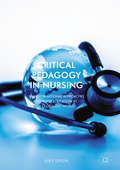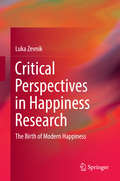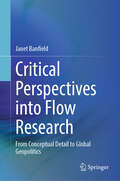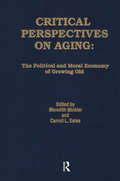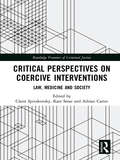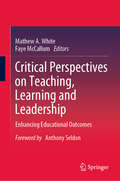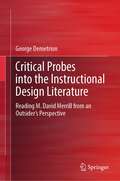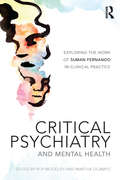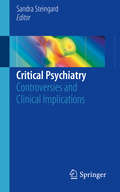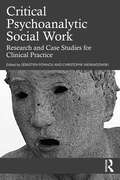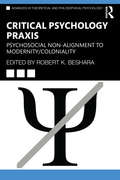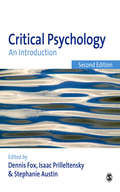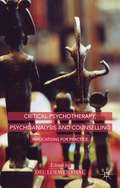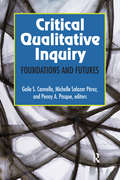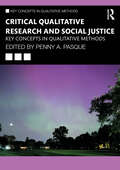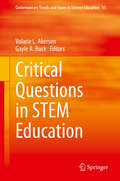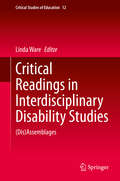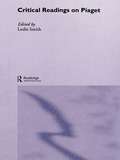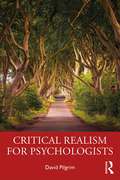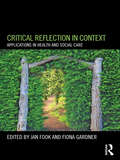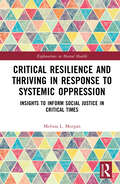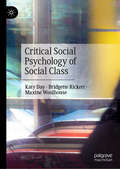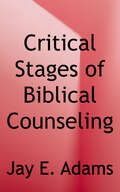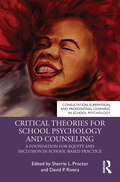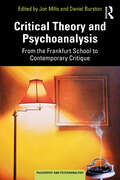- Table View
- List View
Critical Pedagogy in Nursing: Transformational Approaches to Nurse Education in a Globalized World
by Sue DysonThis book explores the academic processes of nursing education in times of uncertainty around healthcare policy and healthcare provision. Grounded in research examining current theory, policy and culture around nursing pedagogy, Sue Dyson addresses the core issues facing nurses today and argues that the current curriculum no longer reflects or serves contemporary nursing practice. In a time of scandals, cuts in funding and shortfalls in the profession, this book provides an answer to the growing call for a dynamic restructuring of nurse education. Offering a critical analysis of innovative pedagogies for nursing, the author proposes the notion of the co-created curriculum as a way forward for nurse education in the post-Francis era. This will be an invaluable read to academics, practitioners and policy makers in the fields of nursing, medicine, education, education policy and medical sociology.
Critical Perspectives in Happiness Research: The Birth of Modern Happiness
by Luka ZevnikThis book presents an interdisciplinary exploration of the origins of happiness in the modern Western culture and makes the argument that happiness is not universal but is instead a culturally and historically specific experience, characteristic only to the Western world. It begins with an overview of the main research approaches to happiness and then studies the important but elusive theme in the context of culture and relations of power. The second part of the book analyses the social, religious, ethical and political processes that lead to the emergence of the experience of happiness, including consumer culture in contemporary societies. It presents an analysis of the medieval Christian experience which concludes that the modern experience of happiness only emerged in the 17th and 18th century, when the ideal of human existence increasingly started to be pursued in the present life. In its conclusion, this book explores the concept of modernization as the collective pursuit of happiness.
Critical Perspectives into Flow Research: From Conceptual Detail to Global Geopolitics
by Janet BanfieldThis book breaks down barriers between disciplines engaging with flow, by speaking from geography into psychology to establish geographical foundations for this psychological phenomenon. It frames and works with the multiple contradictions within the extant literature as productive rather than prohibitive, thereby encouraging collaboration across discrepancies as well as across disciplines. It incorporates new materials and perspectives to research on flow, including aesthetic theory, new materialism, more-than-human geographies, and critical development geographies to broaden the theoretical and empirical landscape of future flow scholarship. It also digs more deeply into pre-existing areas of interest within flow research than has been done before, for example, with respect to ‘dark’ flow, ‘flowability’ and (tele)presence, to facilitate more nuanced engagement with such terms. It takes a step back from the detailed empirical work that characterizes most current flow research to pose questions as to how such divergent, even contradictory, findings can emerge from scholarship on a supposedly universal experience that is purportedly robustly constructed, and whether this contrariness is necessarily problematic or emblematic of flow itself and therefore worthy of conceptual elaboration. Finally, it evokes global scale and long-term critical perspectives on the future evolution of flow to counteract the presentism within existing work that emphasizes immediate gains (e.g., performance, wellbeing, profit), in an attempt to pre-empt the worst ramifications of the progressive commodification and strategization of flow. This innovative book is of interest to scholars from a range of fields, from psychology, to business and human resource management, leisure studies, and critical human geography.
Critical Perspectives on Aging: The Political and Moral Economy of Growing Old (Policy, Politics, Health and Medicine Series)
by Meredith Minkler Carroll L. EstesThis unique volume brings together 20 critical essays on aging within the context of the broad social, political, and economic factors that help shape and determine the realities of growing old. Rather than viewing aging in isolation, it explores the social creation of old age dependency and the profound influence of race, gender, and social class on what it means to grow old. It looks too at such topics as the "biomedicalization" of aging; the role of business and the media in changing societal images of the old; the fact and fiction behind "senior power"; the multibillion dollar nursing home industry; and the role of advanced capitalist nations in creating economic dependency among elders in the Third World.
Critical Perspectives on Coercive Interventions: Law, Medicine and Society (Routledge Frontiers of Criminal Justice)
by Adrian Carter Claire Spivakovsky Kate SeearCoercive medico-legal interventions are often employed to prevent people deemed to be unable to make competent decisions about their health, such as minors, people with mental illness, disability or problematic alcohol or other drug use, from harming themselves or others. These interventions can entail major curtailments of individuals’ liberty and bodily integrity, and may cause significant harm and distress. The use of coercive medico-legal interventions can also serve competing social interests that raise profound ethical, legal and clinical questions. Examining the ethical, social and legal issues involved in coerced care, this book brings together the views and insights of leading researchers from a range of disciplines, including criminology, law, ethics, psychology and public health, as well as legal and medical practitioners, social-service ‘consumers’ and government officials. Topics addressed in this volume include: compulsory treatment and involuntary detention orders in civil mental health and disability law; mandatory alcohol and drug treatment programs and drug courts; community treatment orders; the use of welfare cards with Indigenous populations; mandated treatment of seriously ill minors; as well as adult guardianship and substituted decision-making regimes. These contributions attempt to shed light on why we use coercive interventions, whether we should, whether they are effective in achieving the benefits that are offered to justify their use, and the impact that they have on some of society’s most vulnerable citizens in the names of ‘justice’ and ‘treatment’. This book is essential reading for clinicians, researchers and legal practitioners involved in the study and application of coerced care, as well as students and scholars in the fields of law, medicine, ethics and criminology. The collection asks important questions about the increasing use of coercive care that demand to be answered, and offers critical insights, guidance and recommendations for those working in the field.
Critical Perspectives on Teaching, Learning and Leadership: Enhancing Educational Outcomes
by Mathew A. White Faye McCallumThis book addresses the significant problems that can arise for pre-service teachers, teachers and school leaders who are unprepared for the complexities of 21st century teaching. It focuses on major factors impacting teacher preparation during an era of significant change, including student learning, academic growth, classroom practice, and the efficacy of teachers. In turn, the book considers crucial aspects that can enhance educational outcomes and investigates questions including what impact the changing nature of teachers’ work has on teacher preparation; how educators can evaluate blended learning; and what impact teachers have on learners. This book provides evidence-based approaches that can be used to achieve a positive impact on education and narrow the gap in contemporary and emerging global topics in education.
Critical Probes into the Instructional Design Literature: Reading M. David Merrill from an Outsider’s Perspective
by George DemetrionThis book provides a comprehensive study of the work of M. David Merrill, a major pioneer in the field of instructional design. This book centers on his research on his second generation instructional design (ID2) theory, Instructional Transaction Theory, and First Principles of Instruction, which has had a substantial impact on the instructional design field. It’s appealing to the instructional design research and practitioner-based communities who can draw on specific sections of this book to enhance their own work. It is also intended for those seeking to learn more about the relationship between the instructional design field, learning theory, curriculum studies, and lifelong learning/adult education studies. Through this critical, yet empathetic study of Merrill’s 50+ year research agenda, this book provides an illuminating field of entry into a broad range of topics, both those that are central to Merrill’s own research agenda, and into areas that extend well beyond his essentially cognitivist epistemological assumptions.
Critical Psychiatry and Mental Health: Exploring the work of Suman Fernando in clinical practice
by Roy Moodley Martha OcampoCritical Psychiatry and Mental Health critically explores the current theory and practice of ethno-psychiatry and multicultural mental health practices and policies. Through an in-depth discussion of the work of Suman Fernando, one of the world’s leading scholars and researchers in race, culture and mental health, an international selection of contributors discuss and debate issues affecting mental health and minority ethnic individuals and groups. The book offers a new approach to global mental health, arguing that the use of outdated and outmoded ways in which psychiatry is researched and practiced is a thing of the past, that social justice can only be achieved through a more democratic approach to mental health care and emphasising that the inclusion of cultural and traditional healing methods and practices are vital to meeting diverse needs. Split into five parts, the book covers: Critique of Western Psychiatry and Mental Health Challenges and Opportunities in Mental Health Care Training and Development in Mental Health Practice Transnational Contexts: Engaging the work of Suman Fernando Personal Reflections on Suman Fernando’s Life and Work Critical Psychiatry and Mental Health is ideal for researchers and practitioners in health and mental health, psychiatry, counselling and psychotherapy and anyone interested in the intersection of race, culture and mental health.
Critical Psychiatry: Controversies and Clinical Implications
by Sandra SteingardThis book is a guide for psychiatrists struggling to incorporate transformational strategies into their clinical work. The book begins with an overview of the concept of critical psychiatry before focusing its analytic lens on the DSM diagnostic system, the influence of the pharmaceutical industry, the crucial distinction between drug-centered and disease-centered approaches to pharmacotherapy, the concept of “de-prescribing,” coercion in psychiatric practice, and a range of other issues that constitute the targets of contemporary critiques of psychiatric theory and practice. Written by experts in each topic, this is the first book to explicate what has come to be called critical psychiatry from an unbiased and clinically relevant perspective. Critical Psychiatry is an excellent, practical resource for clinicians seeking a solid foundation in the contemporary controversies within the field. General and forensic psychiatrists; family physicians, internists, and pediatricians who treat psychiatric patients; and mental health clinicians outside of medicine will all benefit from its conceptual insights and concrete advice.
Critical Psychoanalytic Social Work: Research and Case Studies for Clinical Practice
by Christophe Niewiadomski Sébastien PonnouThis international and interdisciplinary collection argues for the use of clinical-based practices and research in social work, bringing together critical psychoanalytic ideas into social work practice to help tackle contemporary issues. With a Foreword written by Stephen Webb, this book brings together specialists from the main areas of research and clinical practices in social work, ranging from psychoanalysis, sociology, clinical psychology, ethnopsychiatry and philosophy. Arguing for a movement away from evidence-based practice, chapters discuss the need for psychoanalytic thought in contemporary social work knowledge, how this can be integrated in social work practice and training, the challenges faced by training and practicing social workers and the ethical issues relating to clinical-based practice. Filled with case studies throughout, these diverse and rich contributions will make social workers think deeply about advocacy, ethics and the systemic changes needed in the field. This book will be invaluable reading to training and practicing clinical social workers and mental health professionals interested in social intervention. It will also be interesting to psychoanalysts as well as those studying sociology, clinical psychology and philosophy.
Critical Psychology Praxis: Psychosocial Non-Alignment to Modernity/Coloniality
by Robert K. BesharaThis collection of chapters advances critical psychology by incorporating praxis (theory and practice) and decolonial streams of thought. They are united around a theme of psychosocial non-alignment to modernity/coloniality. Bringing together a transdisciplinary range of authors from around the world, this edited volume weaves together a spectrum of complex arguments and perspectives to lay the foundations for bridging the Global North–South divide in critical psychology through solidarity and dialogue. The book’s central argument is to emphasize praxis and transdisciplinarity over disciplinary fundamentalism. Psychology is only a starting point and not the end goal of critique in this book; incidentally, some of the authors are not even psychologists. Instead, the book draws on decolonial theoretical resources, such as Chican@ Studies, Black Male Studies, and Critical Pedagogy, to complement traditional theoretical resources like psychoanalysis, Marxism, poststructuralism, and feminism. This groundbreaking text is suitable for scholars and upper-level undergraduate and postgraduate students studying critical discourse, the psychology and philosophy of post-coloniality, conceptual and historical issues in psychology, as well as anthropology and sociology courses engaging with action research.
Critical Psychology: An Introduction
by Isaac Prilleltensky Stephanie Austin Dennis Fox`Do read this book - it will refresh you if you have not come across critical psychology before. If you are already "critical", this is an excellent, up-to-date overview of the area′ - THE (Times Higher Education) ′An excellent book in all respects - compulsory reading for scholars interested in a socio-political contextual analysis of complex human behaviour′ - Professor David F Marks, City University, London ′The arrival of a Second Edition of this classic is an exciting event. The editors have assembled a world class array of authors to bring students to the forefront of critical scholarship today. Adding to the work′s lustre are fresh new chapters on critical social issues, along with a set of new pedagogical aids. Bravo!′ - Kenneth J. Gergen, Senior Research Professor, Swarthmore College The Second Edition of Critical Psychology extends the original′s comprehensive and accessible critique of mainstream psychology. Fully revised, reconfigured and expanded, the Second Edition explores critical psychology′s continued growth and diversification, offering practical advice, and noting significant theoretical and political dilemmas confronting critical psychologists today. While other texts focus on narrower specialties within critical psychology or on specific theoretical or methodological perspectives, Critical Psychology retains its focus on critical psychology as a whole. Key features of the new edition include: - each chapter now also includes a summary of main points, a glossary of important terms, suggested readings and Internet sites, and questions for discussion - the book′s contributors - most of them new - have thoroughly updated the original chapters and provide multiple perspectives on critical psychology′s core concerns - reflecting recent developments, Parts Three and Four are completely new to this edition. Part Three provides in-depth coverage of critical psychology′s relevance to social justice, focusing on the issues of race, class, gender, disability, colonization/globalization, human rights/social justice in post-conflict settings, and oppression/empowerment in mental health systems. Part Four examines critical psychology practice, from theory, methodology and therapy to community organizing and the politics of resistance.
Critical Psychotherapy, Psychoanalysis and Counselling
by Del LoewenthalThere is increasing concern about the growing state influences on the talking therapies. Critical Psychotherapy, Psychoanalysis and Counselling: Implications for Practice is a response to that concern. It is the first book to assess the use of the word 'critical' as a prefix for psychotherapy, psychoanalysis and counselling. It also contributes to an understanding of such issues as capital governance, power and social inequalities, and their influence on the provision of the talking therapies in our neoliberal society. In this groundbreaking book, authors from Europe and North America are brought together to offer a background to critical movements in the mental health fields and to consider what psychotherapy, psychoanalysis and counselling can learn from them. The chapters look at what 'critical' means in terms of both theory and practice, from perspectives such as queer theory, feminism, Marxism and users of talking therapies, and explore implications for training and education in the talkingtherapies. This book will be of interest to practitioners and students in psychotherapy, psychoanalysis, counselling and counselling psychology as it is not only a welcome exploration of the way in which the state influences the talking therapies, but it also encourages critical thinking about both theory and practice.
Critical Qualitative Inquiry: Foundations and Futures (The\qualitative Inquiry: Critical Ethics, Justice And Activismseries Is A Collection Designed To Provide A Cross-disciplinary Overview Of The Use Of Qualitative Research As An Avenue For Justice And Critical Transformative Activism/action Socially, Environmentally, And Related To More-than-human/human Entanglements. Much Of This Work Has Been/is Labeled Critical Qualitative Research. Scholarship T)
by Gaile S Cannella Michelle Salazar Pérez Penny A PasqueCritical approaches to qualitative research have made a significant impact on research practice over the past decade. This comprehensive volume of contemporary, original articles places this trend in its historical context, describes the current landscape of critical work, and considers the future of this turn. The book-includes contributions from some of the leading qualitative researchers on three continents;-consists of big-picture articles that describe the dimensions of this research tradition;-situates critical qualitative inquiry in the overall development and landscape of qualitative research.
Critical Qualitative Research and Social Justice: Key Concepts in Qualitative Methods (Key Concepts in Qualitative Methods)
by Penny A. PasqueCritical Qualitative Research and Social Justice is an encyclopedia-esque book that is a must have for any researcher interested in critical and social justice qualitative research.It helps readers understand and navigate the labyrinthine of critical and social justice concepts available for qualitative research studies. The book focuses on critical, decolonial, transformative, critical interpretivist, participatory, or related approaches that disrupt dominant paradigms, unapologetically name issues of power, identify and overturn oppressive policies, and engage with communities in meaningful ways. There are 28 chapters that take up a different critical and/or social justice research concept and define it for readers. The chapters are not mutually exclusive but overlap and connect with each other. As such, readers can draw from different chapters as they create their own critical and/or social justice research designs.This book will be of interest to researchers (faculty, institutional researchers, graduate students, nonprofit research or assessment people, etc.) across fields and disciplines who are interested in crafting quality research designs and making a concerted difference with their research.
Critical Questions in STEM Education (Contemporary Trends and Issues in Science Education #51)
by Valarie L. Akerson Gayle A. BuckThis edited volume offers a crosscutting view of STEM and is comprised of work by scholars in science, technology, engineering, and mathematics education. It offers a view of STEM from the disciplines that comprise it, while adhering to the idea that STEM itself is an interdisciplinary treatment of all the associated disciplines in a meaningful way. This book raises and answers questions regarding the meaning of STEM education and research.This volume is divided into three sections: the first one describes the nature of the component disciplines of STEM. The next section presents work from leaders representing all STEM disciplines and deals with aspects such as K-12 and post-secondary education. The last section draws conclusions regarding the natures of the disciplines, challenges and advantages of STEM education in terms of theoretical and practical implications. The two final chapters compile arguments from the research chapters, describing themes in research results, and making recommendations for best STEM education practice, and examining areas for future research in STEM education.
Critical Readings in Interdisciplinary Disability Studies: (Dis)Assemblages (Critical Studies of Education #12)
by Linda WareThis edited volume includes chapters on disability studies organized around three themes: Theory, Philosophy and Critique. Informed by a range of scholars who may or may not fashion their work beneath the banner of disability studies in explicit terms, it draws connections across a range of identities, knowledges, histories, and struggles that may, on the face of the text seem unrelated. The chapters are cross-categorical and interdisciplinary for purposes of complicating disability studies across international contexts and multiple locations that consider practice-oriented and intersectional approaches for analysis and advocacy. This integrative approach heralds more powerful ways to imagine disability and the conversation on disability.
Critical Readings on Piaget
by Leslie SmithFirst published in 1996. Routledge is an imprint of Taylor & Francis, an informa company.
Critical Realism for Psychologists
by David PilgrimThis is the first dedicated text to explain and explore the utility of critical realism for psychologists, offering it as a helpful middle ground between positivism and postmodernism. By introducing its basic concepts, Pilgrim explains critical realism to psychologists and shows how the interface between the natural and social worlds, and the internal and external, can be used to examine human life. This both/and aspect of human life is important in another sense: we are both determined and determining beings, making choices but within the material constraints of both our bodies and the social context of our unique existence. The book offers an exploration of academic and applied psychology with that inward and outward curiosity in mind, beginning with the premise that both inner and outer reality are the legitimate interest of psychologists. In doing so, it shows how critical realism endorses the remaining advantages of positivism and postmodernism, while discarding their philosophical errors. A range of case studies are presented to show how psychologists can use critical realism when working with real life problems, as researchers or practitioners.
Critical Reflection in Context: Applications in Health and Social Care
by Jan Fook Fiona GardnerCritical reflection enables practitioners – especially those within health and social care –to theorise from their own practice, improving and developing their work and practising both creatively and professionally. This book provides an accessible overview of the influential Fook/Gardner Critical Reflection framework for students, researchers and professionals. It then presents a wide range of illustrative case studies from a variety of different health and social care settings, demonstrating how it can be used in effective and innovative practice around the world. By highlighting how professionals are actually using the Fook/Gardner model of critical reflection, it shares practical and resourceful ideas and provides specific theoretical and practical guidelines for use. It also further conceptualises and develops the theory of critical reflection by articulating underlying theory used in practice. The book also draws out particular issues for how critical reflection might be better practised within organisations, and develops a framework for a better understanding of this. The book is divided into four parts, discussing critical reflection in: Professional Practice Supervision and Management Research Education Including an up-to-date overview of the framework written by Jan Fook, this helpful text makes a significant contribution in terms of the practical theorizing of critical reflection. It will be of use to health and social care professionals keen to practice creatively and effectively, especially those undertaking short courses or further development in supervision, critical reflection, advanced practice, and leadership and management.
Critical Resilience and Thriving in Response to Systemic Oppression: Insights to Inform Social Justice in Critical Times (Explorations in Mental Health)
by Melissa L. MorganThis book offers new insight into how individuals utilize resilience in the face of structural and social injustice. By drawing on qualitative research methods to foreground the voices of Holocaust survivors and Latinx immigrants to the United States, Critical Resilience and Thriving in Response to Systematic Oppression illustrates the role of cultural values, spirituality, and perseverance in the face of severe institutionalized oppression. Using this to extend current understandings of resilience, the text posits critical resilience as a response to embedded social inequalities and goes on to offer a nuanced reconceptualization of overcoming such hardship, not only as overcoming adversity but as recognizing strengths despite ongoing injustice. It synthesizes feminist and critical theories to elaborate on the framework of critical resilience and thriving. Highlighting the importance of qualitative research on the strengths and resources of oppressed groups, this volume will be of interest to students, scholars, and researchers with an interest in trauma studies, qualitative methods, and personal development, as well as in mental health research.
Critical Social Psychology of Social Class
by Katy Day Bridgette Rickett Maxine WoolhouseThis book argues for the importance of considering social class in critical psychological enquiry. It provides a historical overview of psychological research and theorising on social class and socio-economic status; before examining the ways in which psychology has contributed to the surveillance, regulation and pathologisation of the working-class ‘Other’. The authors highlight the cost of recent austerity policies on mental health and warn against the implementation of further austerity measures in the current climate The book pulls together perspectives from critical social psychology, feminist psychology, sociology and other critical research which examines the discursive production of social class, classism and classed identities. The authors explore social class in educational and occupational settings, and analyse the intersections between class and other social categories such as gender, race, ethnicity and sexuality. Finally, they consider key issues in debates around social class in the broader social sciences, such as the limitations of approaches informed by poststructuralist theory. This book will be a useful resource for both academics and students studying class from a critical perspective.
Critical Stages of Biblical Counseling
by Jay E. AdamsGetting Started: The First Session of Biblical Counseling <p>What you do in the first session will set the tone for what follows--for good or for ill. It will help the counselee gain confidence in your ministry to him and--what is of greater importance--in the Word of God and the God of the Word. <p><p>Breaking Through: The Turning Point of Biblical Counseling <p>The turning point is crucial because true Christian change always involves a closer approximation of the thoughts and the life of the counselee to the thoughts and the ways of God as these are set forth in the Bible. <p><p>Finishing Well: The Termination of Biblical Counseling <p>This final book has to do with closing out a series of counseling sessions--how you know when to do so, how you do it, how you can make certain that you have done the right thing, and how you may follow up.
Critical Theories for School Psychology and Counseling: A Foundation for Equity and Inclusion in School-Based Practice (Consultation, Supervision, and Professional Learning in School Psychology Series)
by Sherrie L. Proctor David P. RiveraCritical Theories for School Psychology and Counseling introduces school psychologists and counselors to five critical theories that inform more equitable, inclusive work with marginalized and underserved student populations. Offering accessible conceptualizations of each theory and explicit links to application in practice and supervision, the book speaks to common professional functions and issues such as cognitive assessment, school-based counseling, discipline disproportionality, and more. This innovative collection offers graduate students, university faculty, and practicum and internship supervisors an insightful new direction for serving learners across diverse identities, cultures, and abilities.
Critical Theory and Psychoanalysis: From the Frankfurt School to Contemporary Critique (Philosophy and Psychoanalysis)
by Jon Mills Daniel BurstonCritical theory has traditionally been interested in engaging classical psychoanalysis rather than addressing postclassical thought. For the first time, this volume brings critical theory into proper dialogue with modern developments in the psychoanalytic movement and covers a broad range of topics in contemporary society that revisit the Frankfurt School and its contributions to psychoanalytic social critique. Theoretical, clinical, and applied investigations in social pathology are explored in relation to new directions in critical cultural discourse from a variety of psychoanalytic perspectives. In this volume, internationally acclaimed social political theorists, philosophers, psychoanalysts, cultural critics, and scholars of humanities examine contemporary issues in social critique that address a myriad of topics. Critical Theory and Psychoanalysis will be of interest to philosophers, psychoanalysts, political scientists, cultural theorists, sociologists, psychologists, religious studies, academe, and those generally interested in the humanities and social sciences.
